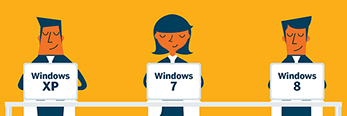New & Notable
Problem Solve
How to fix Windows 11 when it keeps restarting
When a Windows 11 desktop keeps restarting, there are a few factors that might be behind the issue. IT administrators should understand all the possible causes and how to solve them.
Manage
12 best patch management software and tools for 2026
These 12 tools approach patching from different perspectives. Understanding their various approaches can help you find the right product for your needs.
Manage
Desktop decisions harden earlier than CIOs expect
Desktop modernization looks flexible at the outset, but Macs introduce constraints that lock organizations into parallel desktop models far earlier than CIOs typically anticipate.
Get Started
7 steps to fix a black screen in Windows 11
A black screen can be a symptom of several issues with a Windows 11 desktop. Knowing where to look for the source of the problem can simplify the troubleshooting process.
Sponsored Sites
-
Multicloud
Multicloud by Design: The Modern Path to IT Simplicity, Agility and Control

Learn how Organizations must leverage best-in-class technology across public cloud and on-premises environments to address today’s opportunities in digital and workplace transformation.
-
RHEL 10
Smarter Infrastructure. Stronger Security. Ready for AI.

Transform Your Infrastructure into a Smart, Secure Engine for Innovation. With Red Hat Insights on RHEL 10, powered by Intel® Xeon® performance gains and HPE ProLiant reliability, you can achieve up to 501% ROI, reduce downtime by 76%, and deploy workloads faster than ever — creating a future-ready platform for secure AI and modern applications.
-
Server Buying Considerations

Learn more about key server buying considerations from Dell Technologies and Intel® with an emphasis server design, security, sustainability, automation, AI, and financing flexibility.
Find Solutions For Your Project
-
Evaluate
When SaaS softens the OS -- but doesn't erase it
As Windows 10 retires and SaaS reduces OS dependence, Linux desktops are re-emerging as a viable enterprise option driven by cost, control, privacy and hardware flexibility.
-
4 end-user computing trends to watch in 2026
-
How enterprise access decisions are starting to show up earlier
-
Why 2026 might bring more Linux desktops to the enterprise
-
-
Problem Solve
How to fix Windows 11 when it keeps restarting
When a Windows 11 desktop keeps restarting, there are a few factors that might be behind the issue. IT administrators should understand all the possible causes and how to solve them.
-
How IT admins can check BIOS or UEFI versions in Windows 11
-
How to access Windows 11 BIOS configuration with hotkeys
-
How to reset Windows 11 PC from BIOS
-
-
Manage
12 best patch management software and tools for 2026
These 12 tools approach patching from different perspectives. Understanding their various approaches can help you find the right product for your needs.
-
Desktop decisions harden earlier than CIOs expect
-
7 steps to fix a black screen in Windows 11
-
Top 6 unified endpoint management software vendors in 2026
-
Enterprise Desktop Basics
-
Get Started
7 steps to fix a black screen in Windows 11
A black screen can be a symptom of several issues with a Windows 11 desktop. Knowing where to look for the source of the problem can simplify the troubleshooting process.
-
Get Started
Set up MFA in Microsoft 365 to safeguard data
Learn how to set up multifactor authentication in Microsoft 365 to enhance security, prevent unauthorized access and protect critical business data across the organization.
-
Get Started
How to install and set up MSIX and msixbundle
IT admins should know that one of the simplest ways to deploy Windows applications across a fleet of managed desktops is with an MSIX bundle and MSIX files.
Multimedia
Vendor Resources
- Case Study: Cutting costs without slowing down using modern virtual desktop ... –Case Study
- Visionary momentum in desktop as a service: analyst report 2025 –Gartner Magic Quadrant
- Choosing the right cloud desktop: Clarity for a high-stakes decision –Buyer's Guide
-
News
View All -
Application management
Microsoft opens Copilot agent building to office rank and file
The battle for desktop agent mindshare heats up. Microsoft is the latest to arm everyday office workers with tools to make their own, taking on OpenAI, Google and Salesforce.
-
Alternative OSes
Researcher: CrowdStrike blunder could benefit open source
Enterprises with the IT talent might turn to open-source software as a backup for commercial products to mitigate damage from a CrowdStrike-like IT outage, researcher said.
-
Desktop management
Microsoft delivers Copilot Pro, eliminates 300 seat minimum
Copilot Pro, a faster version of Microsoft's AI tool, debuts with features such as 'roll your own GPT,' where users can build custom LLMs, along with looser license requirements.
Search Enterprise Desktop Definitions
- What is end-user experience monitoring (EUEM)?
- What is PC as a service (PCaaS)?
- What is Microsoft Windows 10?
- What is the Windows Management Instrumentation Command-line (WMIC) utility?



